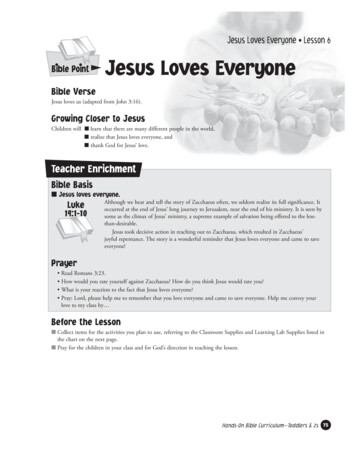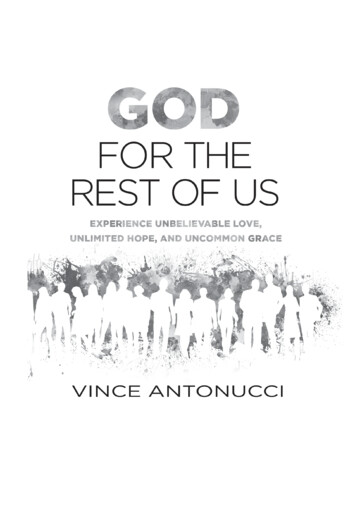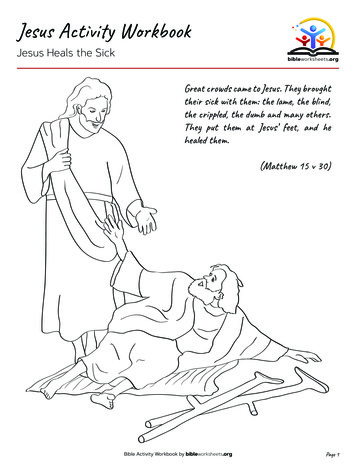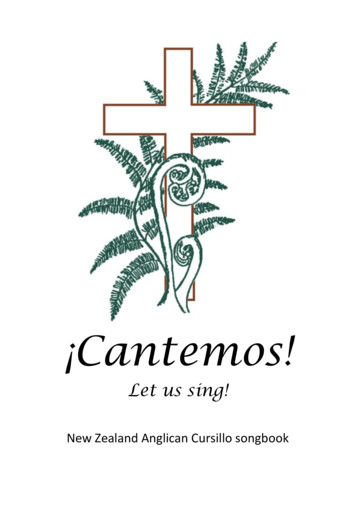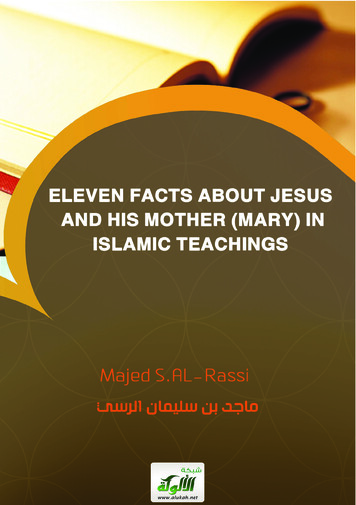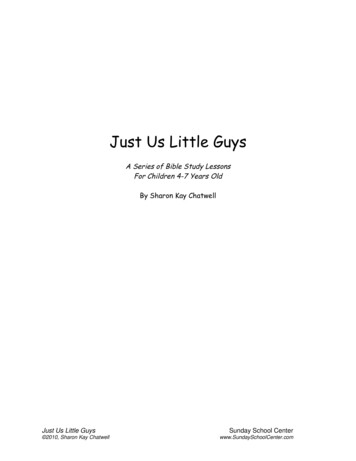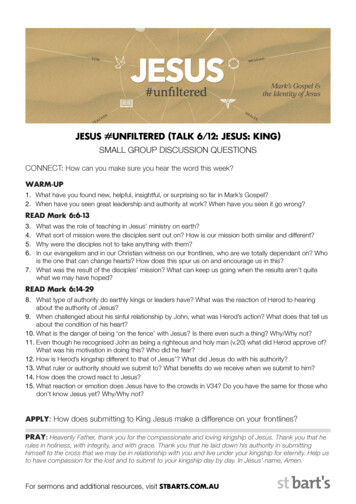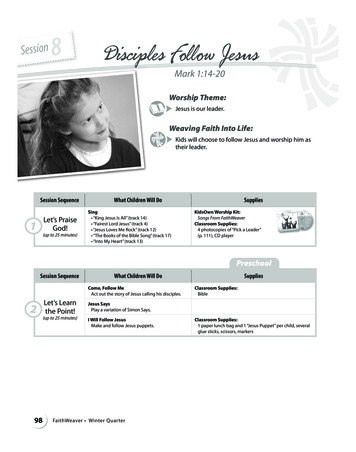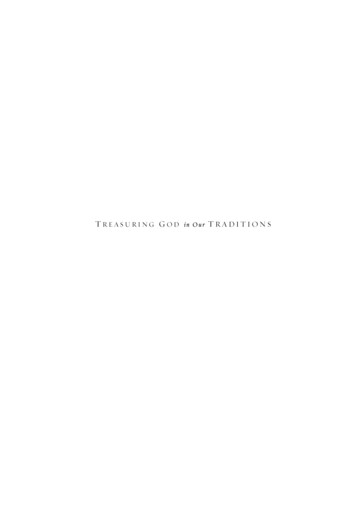
Transcription
TreasuringGodOT.48339.int.qxd8/20/0711:07 AMPage 1T R E A S U R I N G G O D in Our T R A D I T I O N S
TreasuringGodOT.48339.int.qxd8/20/0711:07 AMPage 2A LSO BY N OËL P IPER :Most of All, Jesus Loves You
TreasuringGodOT.48339.int.qxd8/20/0711:07 AMPage 3TREASURINGG OD in OurTRADITIONSN O Ë L P I P E RF O R E W O R DJ O H NA N DP O E T R YP I P E RC R O S S W AY B O O K SWHEATON, ILLINOISB Y
TreasuringGodOT.48339.int.qxd8/20/0711:07 AMPage 4Treasuring God in Our TraditionsCopyright 2003 by Noël PiperPublished by Crossway Booksa publishing ministry of Good News Publishers1300 Crescent StreetWheaton, Illinois 60187All rights reserved. No part of this publication may be reproduced, stored in a retrieval system, or transmitted in any form byany means, electronic, mechanical, photocopy, recording, or otherwise, without the prior permission of the publisher, exceptas provided by USA copyright law.Cover design: Christopher Gilbert / The DesignWorks Group, www.thedesignworksgroup.comCover illustration: Nicholas WiltonInterior photos: SuperStock, Inc.First printing 2003Printed in the United States of AmericaFirst trade paper edition, 2007Scripture verses are taken from The Holy Bible: English Standard Version unless otherwise identified. Copyright 2001 byGood News Publishers. Used by permission. All rights reserved.Scripture quotations marked NASB are taken from the New American Standard Bible . Copyright The LockmanFoundation 1960, 1962, 1963, 1968, 1971, 1972, 1973, 1975, 1977. Used by permission. (www.Lockman.org)Scripture quotations taken from the Revised Standard Version are identified RSV. Copyright 1946, 1953 1971, 1973 bythe Division of Christian Education of the National Council of the Churches of Christ in the U.S.A.Scripture references marked KJV are taken from the King James Version.ISBN 978-1-58134-833-0Library of Congress Cataloging-in-Publication DataPiper, Noël, 1947–Treasuring God in our traditions / Noël Piper; foreword and poems by John Piper.p.cm.Includes bibliographical references.ISBN 1-58134-508-9 (alk. paper)1. Family—Religious aspects—Christianity. 2. Tradition (Theology) I. Piper, John, 1946– II. Title.BT707.7.P57 2003249—dc212003007393L B151 614131 5121 4111 3101 291 1871 060 9540 830 721
TreasuringGodOT.48339.int.qxd8/20/0711:07 AMPage 5DedicationThe bark deep-creased with age; the limbsWere laden down with love, and hymnsWere heard beneath when wind bestirredThe bowing branches with the WordOf heaven. O there were years of shade!John PiperWith gratitude for my beloved “bowing branches”:Uncle Homer and Aunt EdnaUncle James and Aunt MaryUncle Sam and Aunt AliceUncle Buddy and Aunt Lou EllenUncle Hollis and Aunt RachelUncle Zach and Aunt NormaUncle Hal and Aunt Ada SueUncle Roy and Aunt LouAnd especially forDaddy and Mother,George and Pamela Henry
TreasuringGodOT.48339.int.qxd8/20/0711:07 AMPage 6
TreasuringGodOT.48339.int.qxd8/20/0711:07 AMPage 7ContentsForeword by John Piper . 91 Heirlooms . 112 What Is Tradition? . 193 What Makes Tradition Important? . 274How Do Traditions Teach?. 335 “Everyday” and the Ultimate . 416 “Everyday” Traditions, the Family, and the World . 517 “Especially” Traditions . 638 Especially Christmas. 759 Especially Easter . 9110 What Now? . 101Appendix—The Family: Together in God’s Presence . 107Notes . 115Noël Calendar . 116Resources . 117Desiring God Ministries . 120
TreasuringGodOT.48339.int.qxd8/20/0711:07 AMPage 8
TreasuringGodOT.48339.int.qxd8/20/0711:07 AMPage 9Forewordb yJ o h nP i p e rIlove to read my wife’s writing. It’s just like her: velvet steel. Yes, there’s a woman’stouch. She is one. But there’s also an edge because she believes in solid Truth.Long ago we settled it: Manhood and womanhood are different—deeply, maddeningly, and blissfully different. That’s not surprising. But we also agreed on somethingunexpected. What makes the most admirable women admirable, and the most noblemen noble, is the touch that each has of the other’s peculiarity. A rugged man with no“female” tenderness is less a man, and a nurturing woman with no “male” ruggedness isless a woman. So it stopped bothering us that I am the emotional, poetic, expressive onein this marriage, and she is the no-nonsense, suck-it-up, thick-skinned doer.You will hear that, and, I predict, you will like it.I have called our marriage and our home a matrix of Christian hedonism. Yes,four sons were conceived here and one daughter adopted. But our marriage has alsobeen the birthplace of ideas. Or better: the birthplace of vision—seeing God as allsovereign and all-satisfying. Woven into our family life is the conviction that Godis most glorified in us when we are most satisfied in him. His glory and our joy arenot at odds. In this matrix the vision matured; then it shaped everything.Treasuring God in Our Traditions is exactly the right title for this book. God isthe treasure of our lives. We see him in everything. We believe with all our heartsthat “from him and through him and to him are all things.” He gets the glory, weget the joy. My job has been to articulate the vision in writing. Noël has shaped afamily around it. Now she turns that work into words.I pray that this glimpse into our lengthening marriage (we were married in 1968)and into our family history—struggles and all—will clarify for you the biblical visionof the God that we love. Long ago we agreed that our family exists to spread a passionfor God’s supremacy in all things for the joy of all peoples through Jesus Christ. Now,if you wish, you may see a few more of the “all things” where we long to make Godsupreme. We have not “arrived.” The banner over our lives is “Desiring God andLonging to Love,” not “Always Full of Joy in God and Living Radically as a Result.”In this story, as with all stories, test all things and hold fast to what is good. Learnfrom our mistakes. Adapt some of our imperfect successes. Mainly, look for theTreasure. His grace is everywhere. We could not have made it this far without him. Hewill not be hard to find. And when you find him, give thanks that he found you first.FO R E W O R D
TreasuringGodOT.48339.int.qxd8/20/0711:07 AMPage 10h e i r · l o o m r-lüm, 'er-lümn: 'aed onPronunciatiol value handf speciaer.Something oon to anothtiraenegenfrom o10TREASURING GOD IN OUR TRADITIONS
TreasuringGodOT.48339.int.qxd8/20/0711:07 AMPage 111O N EHeirloomsLetter here
TreasuringGodOT.48339.int.qxd8/20/0711:07 AMPage 12Dear Mother,when you lived in Chicago?What kind of fur is the coat you gotLove,NoëlDear Noël,What inthe worldare you wfur coat?riting abThere isout, to wa story.ant to knWhen Iow abouworked int myChicagoKellar (Ain the eaunt Annrly 1940e Hughes, my cos’s daughAppletonusin Camter, sister, Wisconsin, andof Phyllisillatook a trb)uuyrgaecduain and pstom coame to gout up int from futomusic froa small hrrier Eddm a baroietelMoyveersrnight. (Asomewhe.Iwas the sere acrossll night Itting in athe street.could henaother WisrIt madetwo Chrime wondconsin tostian traer if thatwn the wveling sainter nigshared evlesmen mht in 189ening deet in a sm8 whenvotiaollns. On thhotel inspread the spot thBoe gospelscobel andey decideamong od to doInternatither travsomethinonal, noweling meg toin 175 con. Thusuntries.)was bornOh, wellGideons, back tothe fur csubzero eoat. Thexperiencecoat cam. Snuglye just insharp wininsidtime fore it, I wads off Lamy firsts cozy anke Michigdcomfy, noan a blocThat’s a lomkaottrt of worder thetwo aways to say—.you reallmink-dyy wanteded muskrato know,I love yot. That isbut memu,probablyories go wallithlotsMotherof things.12TREASURING GOD IN OUR TRADITIONS
TreasuringGodOT.48339.int.qxd8/20/0711:07 AMPage 13What Do I Do with This Heirloom?t’s been in our attic for three decades, the shabby orange-and-white corrugatedwardrobe box we saved from the movers. For a few years we hung out-of-seasonclothes in it, but now it’s packed with unwanted items left behind one by one wheneach new season blew in. If you were to wipe the dust from the lid and lift it away,you’d find one piece that’s been there for all the thirty years—my mother’s minkdyed muskrat coat.She didn’t really need it anymore, living in warm Georgia. And she was worriedabout me in Minnesota’s deep-freeze winters. The coat was already thirty years oldand showing its age when she sent it to me. I tried it on and felt like a bear. And,besides, with all my friends wearing ponchos and pea coats, it seemed just “too too.”I don’t remember if I ever wore it.But you can’t just toss an icon. I knew its story. This coat was a symbol ofMother’s career-girl days, of the Virginia girl’s fling in the Windy City, of her independent years sandwiched between life with parents and life as a parent. So I stashedthe heirloom in the attic box. I’d decide later what to do with it. Looks like I’ll be leaving the decision to my children. As Mother says, “Memories go with lots of things.”IWhat Would We Do Without This Heirloom?On the first morning of my first visit with my future husband’s family, I lifted thefork for my initial taste of breakfast cake.“Wait.” Johnny stopped me. “This is the way we eat it.” He dunked his chunkof cake into a cup filled with milk. Then he raised it to his mouth and, with whitedrops rolling down his wrist, bit off a big soggy corner. He rolled his eyes to the ceiling and groaned, “Mmm, mmm! They don’t serve us this in the college dining hall,Ma Mohn.” His five-foot-tall grandmother, Erma Mohn, just smiled.She smiled again when I asked her later for the recipe. “Recipe? You can watchand write down what I do.” So I watched and wrote: “Four handfuls of flour, a walnutsized lump of butter . . .” She told me that she learned breakfast cake from hermother, Geneva Stoner, and that she had learned it from her mother, Martha Loos—an heirloom recipe. Years later, when Ma Mohn died, I packed a frozen breakfast cakeinto my suitcase to take to the other grandchildren gathered for her funeral.Our children have always expected breakfast cake on birthday and holidaymornings. As young adults, they ask for it when they’re home for a visit. After MaMohn’s death, I thought of myself as the chief guardian of this family keepsake,HE I R L O O M S13
TreasuringGodOT.48339.int.qxd8/20/0711:07 AMPage 14Ma Mohn’s Breakfast CakeMix together until the texture of meal:2 c. flour1 tsp. salt1 c. sugar1 tsp. baking powder1 stick margarine, cut into 5-6 piecesRemove “handful” (1/3 to1/ 2cup) of this mix andsave for topping.Mix together in large measuring cup or a bowl:1 c. milk1 Tbs. vinegar1 tsp. baking sodaAdd liquid mixture to dry mixture, along with2 eggsMix well and pour into greased 9 x 13 cake pan or10 x 15 jelly roll pan. Sprinkle with topping.ToppingMix together:Reserved dry ingredients1-2 tsp. cinnamon (optional)1/2c. flour1/2c. brown sugarLump of margarine the size of a large walnut(2-3 Tbs.)Bake for 25-30 minutes at 325 degrees.14TREASURING GOD IN OUR TRADITIONS
TreasuringGodOT.48339.int.qxd8/20/0711:07 AMPage 15until we visited Benjamin and Melissa, our son and his bride, and she served usbreakfast cake. So now this heirloom belongs also to my children, who are at leastthe sixth generation enjoying it.Traditions are a lot like heirlooms. Both probably have come to us through ourfamilies. Some you love; you can’t imagine life without them. Some you’re stuckwith; you don’t know what to do with them.What are the traditions we’re leaving our children, the next generation? Whichtraditions deserve to be stuck away in the attic? Into which traditions do we love todraw other people?God– Our Father and Our InheritanceBoth heirlooms and good traditions strengthen our sense of history and belonging.As Christians, our history is God’s story of drawing us into his family. “‘I will be afather to you, and you shall be sons and daughters to me,’ says the Lord Almighty”(2 Corinthians 6:18).It is as God’s children that we find our sense of belonging. “You have receivedthe spirit of adoption as sons, by whom we cry, ‘Abba! Father!’ The Spirit himselfbears witness with our spirit that we are children of God, and if children, thenheirs—heirs of God and fellow heirs with Christ” (Romans 8:15-17).We who are trusting Christ are the heirs of our Father, God. But what is the inheritance that we want from our Father? In this passage, Paul pictures us calling to him,“Abba! Father!” We are like children at the end of a long day. The only thing we want isour abba, our daddy. The yearning of our hearts is for him. And that is the great treasure we inherit from our heavenly Father—himself.As David wrote in Psalm 37:4, “Delight yourself in the LORD, and he will giveyou the desires of your heart.” The inheritance we will receive from God is what wedelight in most gladly and desire most deeply, the Lord himself.With any other father, we would not receive our inheritance until he died.But God is eternal; he never dies. He is the Father who never leaves us nor forsakesus (Hebrews 13:5). He gives us himself.We might wonder what is left to inherit if we have already been adopted intohis family and he’s already our Father. What more is there to look forward to?The apostle John answers: “See what kind of love the Father has given to us, thatwe should be called children of God; and so we are. . . . Beloved, we are God’s children now, and what we will be has not yet appeared; but we know that when heappears we shall be like him, because we shall see him as he is” (1 John 3:1-2).He is our Father now, and we are his children now. Yet we are still waiting forsomething—to see him as he is, to be like him as we long to be, and to have theHE I R L O O M S15
TreasuringGodOT.48339.int.qxd8/20/0711:07 AMPage 16passion of God himself to enjoy him. That is our complete inheritance—the fullenjoyment of God himself.Although this book offers ideas that I hope will be helpful as examples of Godcentered traditions, this is not a how-to manual. I am praying that it will inspire usto look at God with fresh eyes, to see and love and desire the treasure that he is.And I’m praying that the traditions of our lives will be filled with the treasure thatfills our heart on “everyday” days and on “especially” days.Why Do Traditions Matter?My husband and I moved into marriage with traditions we inherited from our parents. Having come of age in the ’60s though, breathing the air of anti-authority, noone was going to tell us we had to do everything just like Mom and Dad! But wedid love our parents, and we loved God and wanted our family life to reflect that.So to this day, we’ve kept many “hand-me-downs” from our parents—daily familyBible reading and prayer, for example.Our first conscious challenge to think seriously about what role traditionswould play in our own family came—as it does for many people—with the birth ofour first child. The moment we set foot into our apartment with our newborn,panic poured over me. We had walked out this door as two, I realized, and now wewere walking in as three—forever there would be one more of us. We were responsible for this life, and I couldn’t even keep a philodendron healthy!By God’s grace, our son lived and thrived. My first panic ebbed, replaced bytides of deeper responsibilities. The instant a raindrop falls into the sea, you can’tmake it separate again. When God entrusted a child to us, in an instant that babybecame so intimately a part of us that we couldn’t picture life without him—ever.I couldn’t imagine what my chubby child would be when he grew up. But what Iyearned for had little to do with his adult career. I longed that he be part of us forever—that he be God’s forever.That aspiration blew away any contentment we might have had in assumptionsthat we’d just keep on doing things the way we’d always done. Now we had to think,not just act out of habit.“Why?”–The Big QuestionIn early December, for instance, when Karsten was just over a year old, I thought aboutour meager Christmas traditions. I tried to see them through the eyes of a curious toddler. I imagined the conversations he and I might have during the month:“Huzz-at?”“Candles.”16TREASURING GOD IN OUR TRADITIONS
TreasuringGodOT.48339.int.qxd8/20/0711:07 AMPage 17Then I mentally supplied the question he wouldn’t even know yet to ask:“Why candles?”“Why?” I realized that was a question I was going to have to answer from nowon, not just for Christmas traditions that particular year, but for all years and everyday. At that moment I knew that “just because” was no answer. Nor was “becausethat’s the way Grandmother and Granddaddy do it” or “because it’s pretty” or“because it’s convenient” or “because that’s what everybody does.”In the book of Exodus, Moses displays his understanding of the nature of children and the responsibility of parents: “And when your children say to you, ‘Whatdo you mean by this service?’ you shall say, ‘It is the sacrifice of the LORD’s Passover,for he passed over the houses of the people of Israel in Egypt’” (12:26-27).Moses assumes children will ask why. And he instructs parents to give an answerthat speaks of reality. This instruction is all in the context of laying out for childrenceremonies that will portray the answer. Heis giving them the answer, both spoken andB a r n a b a s’s B a p t i s mdisplayed. And the answer is God—GodWhen Jesus calls a boy to livesaved us, and we honor him, worship him,He bids him come and die,thank him. We and our children need thisAnd promises that he will giveThe Spirit in reply.kind of yearly repetition to impress us withthe weight of what God has done.He bids him turn from deadly sinAnd trust a dying Christ,Traditions are important for anotherAnd find that he will live againreason. We’ve already seen one huge differBeyond the sacrifice.ence between the inheritance we receiveHe bids him bury doubt and dreadfrom God and the one we receive from ourBeneath the water hereAnd raises him then from the deadphysical families: God is both our FatherAnd leaves the drowning fear.and our present and future inheritance, ourHe robes the boy with righteousnessheirloom.Only God Can Bequeath GodThere’s another big difference between thisinheritance and any other that we mightreceive: You can’t bequeath God to your children. You can leave them the fur coat fromyour mother, the forested acres from yourfather, the carved cane from Uncle Claude,and the clock from your grandmother, butthey can’t inherit God from you. God canonly be inherited from God.And covers crimson wrong,And furnishes with royal dressAnd makes his spirit strong.So I rejoice to stand with you,My son, within the graveThat you and I are passing through;Where God alone can save.Eleven years I've called you son,And that is dearly true,And now because of what God's doneI call you brother too.J o h n P i p e r, J u n e 5 , 1 9 9 4HE I R L O O M S17
TreasuringGodOT.48339.int.qxd8/20/0711:07 AMPage 18That’s what my mother was saying one night when I was six. As she kissed megood night and tucked me in, she said, “Now that you’re trusting Jesus as your Savior,I’m your mother and your sister.” She was acknowledging the words of Galatians 3:26:“In Christ Jesus you are all sons of God, through faith.” We only become God’schildren through our faith, not through our parents’ faith. I had gained a relationshipwith God in the same way she had. We both had become his daughters by adoption,through faith. I was not God’s granddaughter who inherited God through my mother’srelationship with him. I was God’s daughter who inherited God directly from God.To all who did receive him, who believed in his name, he gave the right to becomechildren of God. (John 1:12)Now although we cannot bequeath God to our children, we can help them knowhim and understand him in ways that prepare them to believe in his name. “Everyday”and “especially” traditions in a family are an important part of that teaching, of picturing who God is and what he’s done in our home and in the world. Traditions area vital way of displaying our greatest treasure, of showing what—Who—is mostimportant to us.We need to remember, too, that when our traditions are displaying the Treasure ofour lives, he is there to be seen by everyone who comes within our circle. Jesus said,“Let your light shine before others, so that they may see your good works and give gloryto your Father who is in heaven” (Matthew 5:16). God wants our family and others togive glory to him because they’ve seen his light through us. Paul says we should be “children of God without blemish in the midst of a crooked and twisted generation, amongwhom you shine as lights in the world, holding fast to the word of life” (Philippians2:15-16).Guiding Questions for All Our Traditions All Year What is my greatest treasure? What is most precious to me? How do I reflect and express that treasure in my life? How can I pass that treasure on to my childrenand others within my circle?18TREASURING GOD IN OUR TRADITIONS
TreasuringGodOT.48339.int.qxd8/20/0711:07 AM21Page 19T W OWhat IsTr a d i t i o n ?
TreasuringGodOT.48339.int.qxd8/20/0711:07 AMPage 20Habits, Customs, Traditions—What’s the Difference?f we brush our teeth three times a day, we don’t call that a tradition. We call it ahabit. But when we pray before each meal every day—giving thanks to God whofeeds us—we might call it a habit, and we might also call it a tradition.Every time I drive home with a trunk full of groceries, I honk “Shave and ahaircut, two bits!” to signal my husband or one of my sons to come out and haulthe bags into the kitchen. (The dog goes bananas even if the boys don’t.) That’s oneof our family’s customs, but we don’t call it a tradition.On Thanksgiving and other special holidays, the rule at our house is: If thewomen fix it, the men clean it up. (Guess who created that rule! Well, I had goodreason. For twenty-two years I was the only woman in our kitchen!) After the maleshave done their mealtime share of licking the platter clean, they form a relay teamclearing the table, scraping dishes, washing, drying, and putting away. Never mindthat it takes me a week to find everything again—it’s worth it. That’s their gift tome so that I can emerge from the kitchen and enjoy the special day with them. It’sa tradition I’m passing on to my daughters-in-law and daughter.People have many habits or customs, such as taking off shoes when entering ahouse, that we wouldn’t call traditions. On the other hand, good traditions becomeso woven into our lives that they are also habits or customs.IWhat Makes Something a Tradition?Every good gift, including traditions, comes to us “from above, coming down fromthe Father of lights” (James 1:17). God is the inventor of tradition, just as he is theinventor and giver of every other good gift. We could wish for no better authorityto answer our question: What makes something a tradition? So let’s think aboutsome of the times when God was creating traditions for his people.The word tradition isn’t in the Old Testament, but the reality is there. In thepassages where God gives instructions for the ceremonies he designed, he repeatedly makes clear his purposes for these occasions. When we recognize his purposes,we’ll have a better idea as to what makes a godly tradition in our own homes. Aboutthe Passover celebration, for example, we read:It was a night of watching by the LORD, to bring them out of the land of Egypt;so this same night is a night of watching kept to the LORD by all the people of Israelthroughout their generations. (Exodus 12:42)Some of the phrases in the verse help us see at least some of what God hadintended for his people through their traditions.20TREASURING GOD IN OUR TRADITIONS
TreasuringGodOT.48339.int.qxd8/20/0711:07 AMPage 21 “A night of watching by the LORD”—God wants his people to remember what he himself did for them. “A night . . . to the LORD”—God wants them to honor him for whathe’s done. “Throughout their generations”—God wants their children and grandchildren and great-grandchildren to hear the story of his salvation sothey too will remember and honor him.If we look at God’s instructions for the Festival of Booths commemorating theJews’ forty years of desert wanderings, we see another important piece of his purpose. You shall dwell in booths for seven days. All native Israelites shall dwell inbooths, that your generations may know that I made the people of Israeldwell in booths when I brought them out of the land of Egypt: I am theLORD your God. (Leviticus 23:42-43, emphasis added)As with the Passover, God wants his people to celebrate in a way that re-enactsthe story of his mighty deeds. And again he wants the coming generations to hear thestory and celebrate him and what he’s done. Then there is an additional piece: “I am the LORD your God”—God was not just part of their history.Their traditions are to proclaim that he is their God now. He is I AM.Traditions—for Whom?Recently I waited in line at the information desk of a book supermarket. But whenmy turn came and I asked what they had on traditions, the answer man had noanswers, just questions: “You mean like for African-Americans or Native Americans?”Apparently, to him tradition implied ethnic. Then I drove to a nearby Christianbookstore and asked the same question. “You mean like for kids?” But there wasnothing in stock anyway.So who are our traditions for? Let’s go back to the Creator of tradition. Yes,God gave the adults instructions for the Passover and other rituals. But was it all justfor the sake of the children? Was it mainly to give the adults ways to make sure thekids knew their history? In Deuteronomy 11 Moses had some other words for thosesame adults.Traditions—Not Just for the Children’s SakeYes, this passage does end with children. But first come some strong words to theadults. Moses points directly to them: “You shall therefore love the LORD yourGod” (v. 1). And in case they didn’t get the point, he spells it out in verse 2: “I amnot speaking to your children who have not known or seen it.”WH ATISTR A D I T I O N?21
TreasuringGodOT.48339.int.qxd8/20/07Deuteronomy 11:1-3, 7, 18-191Youshall therefore love the LORD yourGod and keep his charge, his statutes,his rules, and his commandmentsalways. 2And consider today (since Iam not speaking to your children whohave not known or seen it), considerthe discipline of the LORD your God,his greatness, his mighty hand and hisoutstretched arm, 3his signs and hisdeeds that he did. . . . 7For your eyeshave seen all the great work of theLORD that he did. . . . 18You shalltherefore lay up these words of mine inyour heart and in your soul, and youshall bind them as a sign on your hand,and they shall be as frontlets betweenyour eyes. 19You shall teach them toyour children, talking of them whenyou are sitting in your house, and whenyou are walking by the way, and whenyou lie down, and when you rise.(See also Deuteronomy 6.)11:07 AMPage 22Grownups are the ones who have a historywith God. We have leaned on his strength,learned his love, and depended on his faithfulness. We have suffered the pain of his discipline and felt the relief of his forgiveness.Our youngest children don’t understandmuch yet about these things. They will learnfrom their experiences as they grow older andfrom the Christian adults in their lives.People with No ChildrenWhich adults are responsible to display theLord to the children? Moses doesn’t separateyoung parents from the rest. He’s speaking toall the adults. This means that tradition isimportant for all of us, even if there are no children in our lives. But most of us do have somechildren in our circles, even if they’re not in ourimmediate household. We have grandchildren,nieces, nephews, or Sunday school kids. Oncemore, before he talks about the children, Moses stresses the responsibility of all theadults: “Lay up these words of mine in your heart and in your soul” (verse 18, emphasis mine).If you are single, traditions may be even more important for you. Your traditions may involve peers who are friends, other adults you want to minister to, andthe children in your life—neighbors, students, friends’ children. The traditions youdevelop and practice will draw others into being your family circle. They can playan important role in keeping you from being isolated.The apostle Paul is a good illustration of a single man who took seriously hisresponsibility to a younger person in his life. As far as we can tell, Timothy’s fatherwas not a spiritual influence in his life. But when Timothy was a young man, Paulbecame a fatherly friend. He wrote Timothy about the importance of following agodly example, spelling out the very qualities we want to see developed in childrenthrough our teaching and tradition.You, however, have followed my teaching, my conduct, my aim in life, my faith, mypatience, my love, my steadfastness, my persecutions and sufferings. . . . Indeed, all22TREASURING GOD IN OUR TRADITIONS
TreasuringGodOT.48339.int.qxd8/20/0711:07 AMwho desire to live a godly life in ChristJesus will be persecute
You will hear that, and, I predict, you will like it. I have called our marriage and our home a matrix of Christian hedonism. Yes, four sons were conceived here and one daughter adopted. But our marriage has also been the birthplace of ideas. Or better: the birthplace of vision—seeing God as all-sovereign and all-satisfying.
